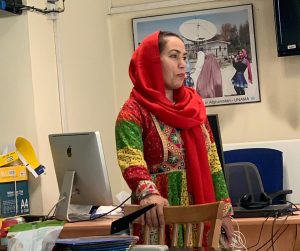Torpekai Amarkhel, a 42-year-old journalist from Afghanistan, was among the 60-plus asylum seekers who died recently when their boat capsized en route to Europe. She was a single passenger among over 200 Afghans, Iranians, and Syrians trying to make it ashore off a boat that embarked from Turkey.
On the shore, lapped by the late winter waves, Italian aid workers finally found her blue and white United Nations ID card this month amid the floating detritus and the skeleton of a small wooden ship. The tempest and cries for help had come and gone.
The deaths added to a confounding story of betrayal, which I find hard to reckon with after having spent nearly two decades associated with Afghanistan as a journalist and public affairs employee of the U.S. government and United Nations. Only this time, the death was that of a friend and colleague.
I had worked closely with Torpekai on stories about Afghan women journalists and all those crucial “human rights” issues that bothered the conscience of anyone who knew the tragedy that lay beneath the surface of a tortured land.
Before the ill-fated U.S. efforts to forge an alleged “peace agreement” between the Afghan government and the Taliban, we exchanged collegial texts:
Me: Hi Torpekai. I am going away for four months. See you when I get back. Be safe!
Torpekai: Oh really, where?
Me: Paris to see the Lady.
Torpekai: Hahaha Hahaha. Enjoy!
Then the Taliban swept to power in a matter of weeks in August of 2021. As I worked safely from home in Washington, D.C., amid a global pandemic, I heard from Torpekai, who lived in Kabul.
Having served the United Nations for several years after a career as a TV news anchor, she knew that her life would be made grim and grimmer by the black-clad, bearded fighters who had seized power. She was a single ethnic Pashtun, which meant that the Taliban authorities could well insist that she be married off to an anonymous warrior against her will in an archaic practice they have maintained since seizing power.
“The situation is not safe in Kabul,” Torpekai wrote to me.
I asked her what she intended to do. She said she had decided to flee to Turkey with a visitor’s visa and from there – she hoped – move on to Europe.
I told her that one of her colleagues had made it out to Australia and encouraged her to be in touch with another U.N. employee I knew who was in Turkey and trying to get to Canada with her newborn.
“Do you know someone who can help me?” she pleaded with me.
Though I wanted to help her, I couldn’t provide much in the way of assurance, since the U.S. government was not offering any assistance to Afghans who had worked in the United Nations. I said, rather pathetically in retrospect, “I will check,” and she thanked me – as was her habit – excessively.
Before Torpekai stepped foot onto the creaky wooden vessel in Turkey, bound for Italy, several colleagues in Kabul warned her not to try the sea route. They sent her pictures of a shipwreck that a U.N. transportation colleague had been in. He had saved his wife and children and drowned himself, they said.
“We warned her not to try,” said a U.N. colleague still stuck in Kabul. “I said, ‘Look, our friend has drowned.’”
Torpekai listened but made up her mind to accept the risk. She had been offered nothing but abuse in Turkey with no hopes of asylum. In the end, she boarded the ill-fated boat, along with her niece and two of her niece’s children, among other relatives. All of them perished in the frigid waters off the Italian coast
Asked to comment on Torpekai’s death, her former Japanese boss (my own as well) and Special Representative for the U.N. Secretary General, Tadamichi Yamomoto, told me: “It is sad that you have to leave your country, your family, your friends, and everything you have loved.”
He added, “Her loss is immense, particularly because Afghans, like all people, deserve to have their own country. The Taliban need to listen to their people.”
I recall Torpekai as one of the kindest and most compassionate co-workers I came to know in two decades in Afghanistan. She kept me abreast on the situation of imperiled female reporters and provided me contacts in the field when I traveled.
I wonder now if there is bigger story that she has conveyed to all of us through her senseless death. I would hope so, but I also am not sure if anyone is listening past the waves that lap the toe of the Italian boot in Calabria.
*****
The betrayal of Afghanistan is apparent on so many levels.
First of all, it is a betrayal on a personal level of all the people who worked for years, keeping the faith – however fleeting at times – in a mission to help a nation move out of a theocratic darkness and into a brighter and more open future.
When the West wasn’t winning in Afghanistan, the military commanders and politicians always found a way to weave a tangled web of deception. It began with the first big lie, when the U.S. military missed a chance to kill Osama bin Laden at the Battle of Tora Bora. Then top commander and U.S. General Tommy Franks insisted that he was never sure bin Laden was there at the time, even as his own intelligence officers begged to differ, as did Vice President Dick Cheney.
After the sound defeat of the Taliban and the “great victory” of U.S. forces, praised as such by most in the too-anxious-to-please U.S. media, policymakers, guided by the stated intentions of Bush administration officials, set out to remake Afghanistan into a semblance of a democracy with a functioning bureaucracy. The mission kept expanding exponentially.
Even in 2009-10, when U.S. President Barack Obama ordered the military surge, I still believed enough to try to work to help with economic assistance across Afghanistan. My sense of betrayal grew sharper when senior officials at the U.S. Agency for International Development (USAID) told me to ignore the fact that a senior Afghan warlord, whom they were paying millions, was opening a key supply route once a week for NATO resupply operations while allowing the Taliban to control it the rest the week in exchange for money.
Meanwhile, the mastermind of 9/11 was killed by U.S. forces in Pakistan in May of 2011 just outside the gates of that nation’s most prestigious military academy, even as the Taliban carried out fresh executions of their foes in the hinterlands and made their killings into propaganda movies.
Westerners like myself took the money, making hefty salaries equal to 10 times more than any of our Afghan colleagues. The Afghans I worked with, while I served in the United Nations and State Department, often paid with their own salaries for the food, housing, and schooling of 10 or 20 Afghans in their family or clan, so the West, if nothing else, could boast something of a “trickle down” impact.
Torpekai was no exception. She helped her fellow Afghans and did the bidding of the United Nations when they agreed to support the idea of a “peace deal” between the Afghan government, a virtual puppet state, and the Taliban, who by 2020 controlled much of the country outside of major population areas. U.S. and other foreign troops were withdrawn except for a small remnant of what had been sent in for the U.S.-led “surge.” They were advised to avoid armed contact with the enemy during the Trump administration. In exchange, the Taliban stopped killing Americans, a point former President Donald Trump brazenly boasted about as recently as this month.
Though the Taliban chuckled and smiled over green tea with U.S. and U.N. envoys before their takeover, by that point there was no longer a doubt – unless you were blinded by the faith of your own good will – that the Taliban had time on their side, and that the government would soon crumble.
Still, United Nations Special Representative for the Secretary General Deborah Lyons and others played along with the doomed U.S.-led peace effort.
Torpekai herself, quoted Lyons in a speech to the U.N. Security Council in 2020, stating, “By all accounts this was a big year. But a bigger year lies ahead… Clearly Afghanistan will continue to move forward…”
The money kept flowing.
In fact, Afghanistan was sliding backwards on the same corrupt and insecure track laid out by the international community. Afghanistan’s fate was sealed by the U.S. government’s stated intention to withdraw – a decision that, it should be recalled, was made by Trump and only seconded by the incoming President Joe Biden.

Torpekai in her job as a TV news anchor in Kabul in 2014, before joining the U.N.
*****
Torpekai understood the contradictions between what the U.S. and U.N. intended and what the realities were. She wrote that journalism, bolstered with a massive influx of Western assistance, “had become a new frontier for women in the country,” but that in practice, “in the field [where she had worked as well] they show up wearing a burqa and do their interviews while wearing it [to remain safe].” It was hard to convince these women that a free press was worth the price, she conceded.
In the end when the Taliban seized power – not just by the stealth of drinking tea and smiling broadly, but with the brute force of guns to the heads of their foe – the U.S. and the U.N. decided to help mostly their own and leave Afghans behind to fend for themselves.
The U.N., despite the pleas of female employees like Torpekai, who insisted their lives were in danger, moved to evacuate only a few U.N. officials who could prove prior persecution by the Taliban. The rest were left behind, resulting in entirely preventable tragedies of desperation.
“I can’t express how sad I am to know about Torpekai’s death,” said Atefa Kakar, a former close U.N. colleague, who is now an outspoken women’s rights advocate in Germany.
“She was a good friend and a strong woman! I personally admire Torpekai’s journey now, knowing that she refused to surrender herself to the hands of the evil Taliban.”
Kakar doesn’t mince her words, as the women in Afghanistan must still do to survive:
Afghanistan is now Prison, a hell and the worst place for any human being in the entire world especially for women and girls. Every single Afghan woman and girl are traumatized by Taliban’s misogynistic agenda of removing them from every sphere of society. Women and girls are being persecuted by all means. Young girls are not allowed to pursue an education and are forced by child marriage to move in with Taliban fighters. Proud women, who fight for rights and their own freedoms, cannot just hide and wait to be tortured, raped, and killed. These are the reasons they flee and are not afraid of death by drowning.
After everything, though, the world still turns away.
As U.N. Secretary General Antonio Guterres, a compassionate European by all accounts, tweeted after the news of the tragedy in the Mediterranean came to light: “Yet another horrific shipwreck has claimed the lives of dozens of people, including children – this time off the coast of Italy.”
He added, “I say once again: Every person searching for a better life deserves safety and dignity. We need safe, legal routes for migrants and refugees.”
But the world’s track record on Afghanistan in particular and migrant rights more broadly does not inspire confidence that anything will change. In the meantime, brave, hopeful, and ultimately doomed people like Torpekai will continue to sink beneath the cold waves of indifference.

































